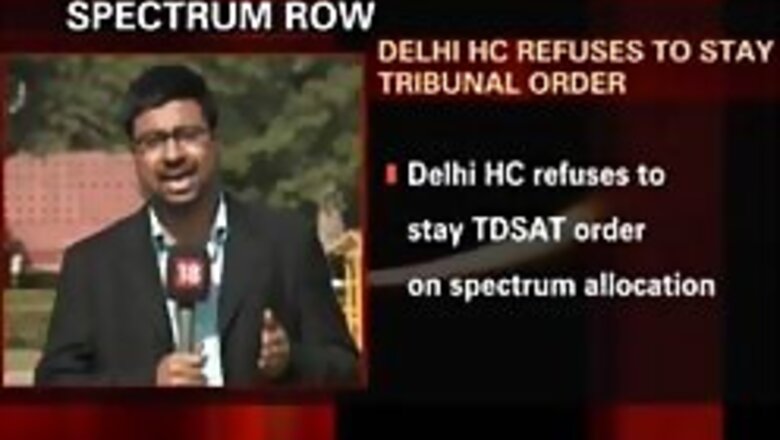
views
New Delhi: The Delhi High Court has refused to stay a recent telecom tribunal order allowing operators to offer services using both GSM and the rival CDMA technology.
GSM operators such as Airtel and Vodaphone appealed for a stay on the policy, saying the policy has been tweaked to benefit reliance .
However, the GSM operators lobby COAI failed to get any relief from Delhi High Court on spectrum allocation. The court refusal to stay the spectrum allocation policy is good news for operators like Reliance Communications.
GSM players had argued in court that this policy has been tweaked to help Reliance, which becomes yet another victory for Anil Ambani owned, Reliance Communication.
GSM mobile operators had earlier asked the government to seek afresh the views of regulator TRAI on spectrum allocation norms and suspend till such time, distribution of initial or additional frequency.
Meeting this condition meant that no new GSM operator will be issued LoI and licences, and existing GSM operators will have no new competition -- both bad for the sector's growth.
But these are some of the conditions that the GSM lobby wants the Department of Telecom (DoT) to meet to ease the tension arising out of new formula for apportioning spectrum and permission to use dual technology.
On behalf of Cellular Operators Association of India (COAI) Akhil Gupta of Bharti Airtel has been deputed to negotiate with the government.
The first meeting between Gupta and Telecom Secretary D S Mathur was held last week, according to a note by Mathur.
Surprisingly, the COAI has completely ignored the "scientific" report of TEC, which was once accepted in principle by the government, and also demand for surrendering the extra spectrum held by them beyond the contractual limit of 6.2 MHz.
According to smaller operators, who have been waiting for start-up spectrum for a long time, these are absolutely anti-consumer conditions as this would delay the entry of new players and thus competition and the government should not come under any such pressure.
Also top sources in DoT are of the view, that existing operators are increasing pressure on DOT every day, because they do not want any new LOI to be issued, so as to ensure the existing oligopoly and abnormal profits.
According to Mathur's note, COAI has refused to accept TRAI's recommendations with regard to four metros and A category circles.
Gupta, according to Mathur, has said that TRAI had made recommendations without widely consulting the stakeholders and therefore, the regulator should be asked to do the needful before giving fresh subscriber linked norms.
The demand for seeking TRAI's recommendations anew comes in the backdrop of a report by the Telecom Engineering Centre, which comprises more experts on mobile telecom and has access to industry input than the regulator does.
Gupta also said that in case, under the revised TRAI recommendations that would be received after the process for consultation has been gone through, any operator is found to be holding excess spectrum they should be given 12 months time to fully exploit the surplus capacity.
However, acceptance of such condition could lead to further litigations as many small operators have been banking on the fact that any extra spectrum held by GSM operators would be returned and then distributed among new players to increase the competition.
According to DoT, at least 5-6 new pan-India operators can be roped in and if they start operations the tariffs can come down further by about 50 per cent.
COAI had also challenged telecom tribunal TDSAT's interim order of not staying the process of allocating spectrum by the government to new players as well as existing ones.
With Agency inputs















Comments
0 comment